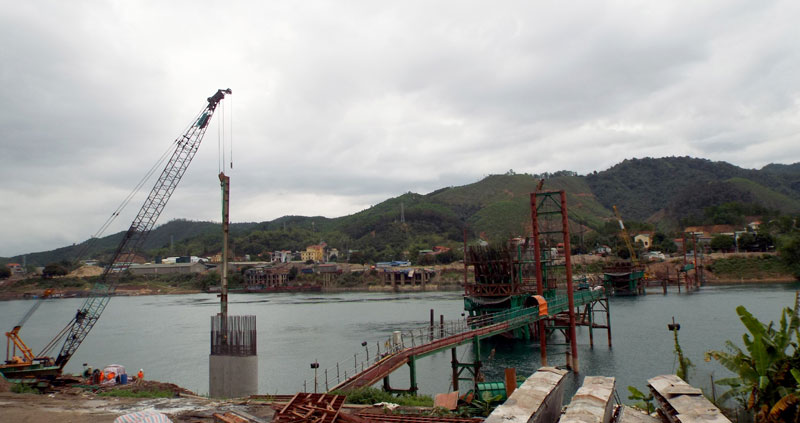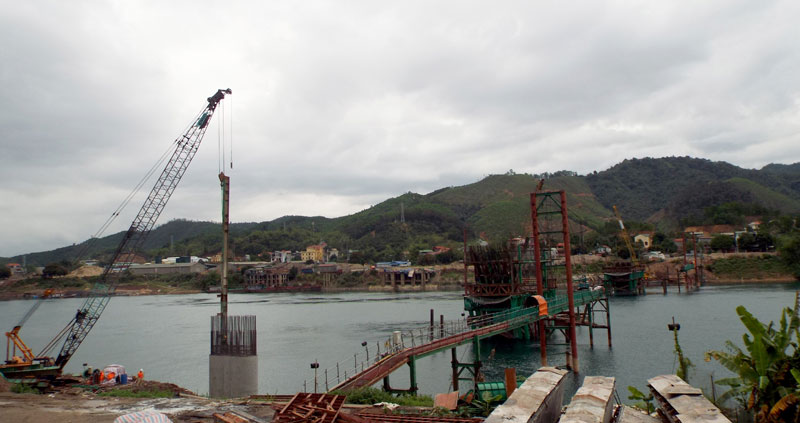
(HBO) – The construction of Hoa Binh 3 Bridge commenced in 2016, which is expected to reduce traffic overload on Hoa Binh 1 bridge and meet the city’s future development demand. The People’s Committee of Hoa Binh city is proposing measures to remove difficulties for land clearance and calital mobilisation, while directing the contractor to work towards joining the final segments of Hoa Binh 3 Bridge in July 2018.
 Contractor of the project utilises all resources to accelerate
the construction of Hoa Binh 3 Bridge.
Contractor of the project utilises all resources to accelerate
the construction of Hoa Binh 3 Bridge.
A total area of 41,721 sq. m.
must be cleared for the Hoa Binh 3 bridge and its approaching roads, affecting 73
households and five units, with 40 households relocated.
Vice Chairman of Hoa Binh
city’s People’s Committee Pham Quoc Thang said despite financial difficulty, the
committee is directing the contractor to mobilise all available human resources
and machinery to connect the last segments of Hoa Binh 3 bridge in July 2018. By
now, 112 billion VND worth of construction work has been completed out of the
total 322 billion VND estimated for the bridge part, with 66.9 billion VND already
disbursed.
Following the direction of the
municipal People’s Committee, the contractor is making maximum use of human
resources with three consecutive working shifts. Total work load to be implemented
this year is projected at 274.5 billion VND.
Some 295 billion VND is needed
to complete the project within 2018. Meanwhile, capital from the source of International
Development Assistance (IDA) for the programme is planned at 21 billion VND for
the 2018-2020 period. To speed up the progress, the municipal People’s
Committee has asked the provincial People’s Committee to advance 21 billion VND
from the local budget to pay installation costs for the contractor as
regulated. The city’s People’s Committee will refund the money after receiving
the IDA capital. The committee also proposed the provincial People’s Committee
allocate 22.29 billion VND for the northern mountainous
urban programme in Hoa Binh city.
Hoa Binh 3 bridge links with Truong
Han Sieu road in Thinh Lang ward on one end and Highway 6 in Trung Minh
commune, Hoa Binh city on the other end. The bridge is 535m long and 16m wide with
three concrete spans. The approach road to the bridge is 209m long and 31m
wide. The Hoa Binh 3 bridge is built with the aim to connect residential areas
on the left and right banks of the Da River and help realise the target of
upgrading Hoa Binh city into a grade-2 city by 2020. The investor of the
project is the People’s Committee of Hoa Binh city while a joint venture of
Trung Chinh construction and trade company and Hoang Son company is the
contractor./.
According to data from the Hoa Binh Provincial Party Committee, the industrial production index for the first six months of 2025 is estimated to have increased by 20% compared to the same period last year. This marks the highest year-on-year growth rate for this period since 2020.
In the first six months of 2025, Hoa Binh province’s export turnover was estimated at 1.145 billion USD, marking an 18.11% increase compared to the same period in 2024. Import turnover was estimated at $ 804 million, a 17.15% increase, which helped the province maintain a positive trade balance.
The lives of the ethnic minority farmers in Tan Lac district have gradually improved thanks to the new directions in agricultural production. This is a testament to the collective strength fostered through the professional associations and groups implemented by various levels of the district’s Farmers’ Union.
With the motto the "product quality comes first,” after nearly one year of establishment and operation, Muong village’s Clean Food Agricultural and Commercial Cooperative, located in Cau Hamlet, Hung Son Commune (Kim Boi district), has launched reputable, high-quality agricultural products to the market that are well-received by consumers. The products such as Muong village’s pork sausage, salt-cured chicken, and salt-cured pork hocks have gradually carved out a place in the market and they are on the path to obtaining the OCOP certification.
In the past, the phrase "bumper harvest, rock-bottom prices" was a familiar refrain for Vietnamese farmers engaged in fragmented, small-scale agriculture. But today, a new spirit is emerging across rural areas of Hoa Binh province - one of collaboration, organisation, and collective economic models that provide a stable foundation for production.
Maintaining growing area codes and packing facility codes in accordance with regulations is a mandatory requirement for agricultural products to be eligible for export. Recently, the Department of Agriculture and Environment of Hoa Binh province has intensified technical supervision of designated farming areas and packing facilities to safeguard the "green passport" that enables its products to access international markets.



 Contractor of the project utilises all resources to accelerate
the construction of Hoa Binh 3 Bridge.
Contractor of the project utilises all resources to accelerate
the construction of Hoa Binh 3 Bridge.